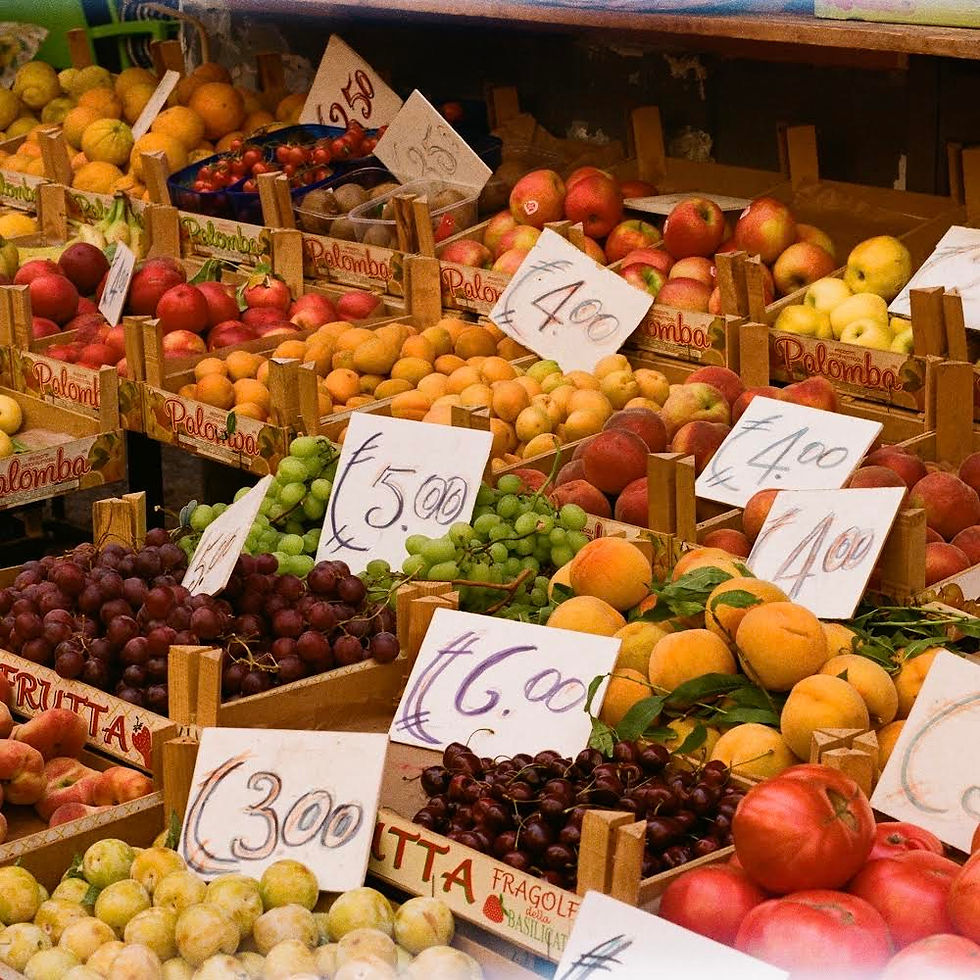Naples: Empty Suitcases and Full Bellies
- Sep 4, 2022
- 4 min read

I can only imagine that my grandma travels to Italy with an empty suitcase. That’s because whenever she comes back from a visit, her suitcase returns full of cheeses, meats, dried herbs, coffee, home grown lemons, biscuits and pastries that get shared out amongst the family. Having grown up with this simply being a usual procedure in my household, I’d never quite realised the genius of her technique. It’s not that you can’t find Italian coffee and pasta in the supermarkets in the UK… but there are some products that simply taste better when they’re from Italy. Or maybe it’s that they taste better when they’re eaten in Italy? Now obviously, it would be unfair of me to leave that question unanswered. So, I took a trip to Naples (the birthplace of pizza) to find out. (Disclaimer: the trip may have been a planned family holiday and not for the sole purpose of me writing a food article)

So, you’ve heard of mozzarella, certo, we all know it well, the creamy white cheese that’s best enjoyed on top of a pizza. But how well do you know mozzarella di bufala? I got to know this oozing ball of buffalo mozzarella pretty well when an entire mound was presented on a plate to me. I had this entire ball of mozzarella to myself, as a single course amongst an absolute feast that I was served at my uncle’s home in the outskirts of Naples. I didn’t need to go to Italy to tell you that Italian mozzarella is better than your store-bought equivalent in the UK, but I did need to go to the Campania region to tell you that it’s mozzarella di bufala that is quite literally the crème de la crème of fresh, milky cheeses. It is for this reason that if you ever find yourself eating a pizza in Naples, I recommend you choose one with mozzarella di bufala. But in any case, if you do find yourself eating pizza in Naples, you’re probably already having a good time.

I have a really sweet tooth but because of my nut allergy, I often have to say no to a lot of delicious looking Italian treats (oh how they love to sprinkle pistachios and almonds on everything!). But one Neapolitan pastry that comes perfectly nut free and that I will always say yes to is the sfogliatella. Shaped like a shell, the sfogliatella is made with thin layers of Italian pastry and its pearly white filling is usually a mix of ricotta, citrus and vanilla. Thankfully, the sfogliatella is a not too-hidden treasure that you can find on land and even more easily in the land of Naples. I tried one of these as an early morning snack accompanied with an espresso in one of Naples’ chandelier-clad cafes, overlooking the royal palace - so let’s face it, it was never going to taste that bad. Other sweet treats you may want to try in Naples include the fiocchi di neve and babà al rum. And an added tip for anyone travelling with food allergies or intolerances like me: make sure you always check the FCDO’s country specific advice on health insurance, emergency numbers abroad, travelling with medication and how to access health services abroad. If you sign up for a GHIC card you can access essential medical treatment abroad, but don’t forget to take out extra insurance as this won’t cover all health costs. Some of my best personal advice for anyone travelling with a serious allergy is to take a travel card explaining your allergy in the local language so you can ensure nothing will get lost or miscommunicated in translation!

I have never seen lemons so big as the ones you can find in Naples and the Amalfi. In fact, I wasn't even aware lemons could grow so big. And when life gives you lemons of that quality, the Italians are making REAL lemonade. At a kiosk in the centre of Naples you will find a fresh lemonade made with Sorrento lemons, sparkling water and bicarbonate of soda. Despite the unique tradition behind the lemonade stand, this is not a drink to be savoured but rather one you must immediately gulp down before it fizzes all over you. And it isn't the only lemon drink you’ll find in Naples. Of course, there is also limoncello, the citrusy liquor that you’re often served after a meal at an Italian restaurant. If you take a trip to Sorrento or the Amalfi coast, you will see the streets lined with plenty of shops, each trying to sell you their own limoncello. Maybe it is a tourist trap, but does that mean I am going to say no when each shop offers me a taste of their homebrewed limoncello? Certainly not. I would also recommend the meloncello - which is made with white cantaloupe melons instead of lemons and has a slightly sweeter taste!

Whilst I couldn’t bring you back a suitcase of Neapolitan delicacies (trust me, I wish I could), I hope to have given you at least a taste of what Naples can offer. I would really like to tell you more about the seafood, aubergines and zucchini that I sampled (all of which taste amazing both grilled and fried) but I will have to leave those for you to discover. If you are travelling abroad and decide to bring back any food products, always check the restrictions on what food you can and can’t bring in your suitcase. The rules on bringing meat, dairy, fish and other animal products into the UK depend on the country you’re bringing it from. But the verdict is, Italian food certainly does taste better in Italy. So that leaves one thing left to say, I wish you buon viaggio and buon appetito.


- Francesca Fantoni




Comments